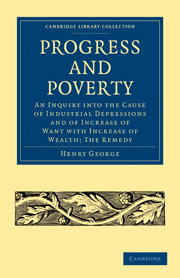 Progress and Poverty
Progress and Poverty Published online by Cambridge University Press: 07 September 2011
We have traced the want and suffering that everywhere prevail among the working classes, the recurring paroxysms of industrial depression, the scarcity of employment, the stagnation of capital, the tendency of wages to the starvation point, that exhibit themselves more and more strongly as material progress goes on, to the fact that the land on which and from which all must live is made the exclusive property of some.
We have seen that there is no possible remedy for these evils but the abolition of their cause; we have seen that private property in land has no warrant in justice, but stands condemned as the denial of natural right—a subversion of the law of nature that as social development goes on must condemn the masses of men to a slavery the hardest and most degrading.
We have weighed every objection, and seen that neither on the ground of equity or expediency is there anything to deter us from making land common property by confiscating rent.
But a question of method remains. How shall we do it? We should satisfy the law of justice, we should meet all economic requirements, by at one stroke abolishing all private titles, declaring all land public property, and letting it out to the highest bidders in lots to suit, under such conditions as would sacredly guard the private right to improvements.
To save this book to your Kindle, first ensure no-reply@cambridge.org is added to your Approved Personal Document E-mail List under your Personal Document Settings on the Manage Your Content and Devices page of your Amazon account. Then enter the ‘name’ part of your Kindle email address below. Find out more about saving to your Kindle.
Note you can select to save to either the @free.kindle.com or @kindle.com variations. ‘@free.kindle.com’ emails are free but can only be saved to your device when it is connected to wi-fi. ‘@kindle.com’ emails can be delivered even when you are not connected to wi-fi, but note that service fees apply.
Find out more about the Kindle Personal Document Service.
To save content items to your account, please confirm that you agree to abide by our usage policies. If this is the first time you use this feature, you will be asked to authorise Cambridge Core to connect with your account. Find out more about saving content to Dropbox.
To save content items to your account, please confirm that you agree to abide by our usage policies. If this is the first time you use this feature, you will be asked to authorise Cambridge Core to connect with your account. Find out more about saving content to Google Drive.